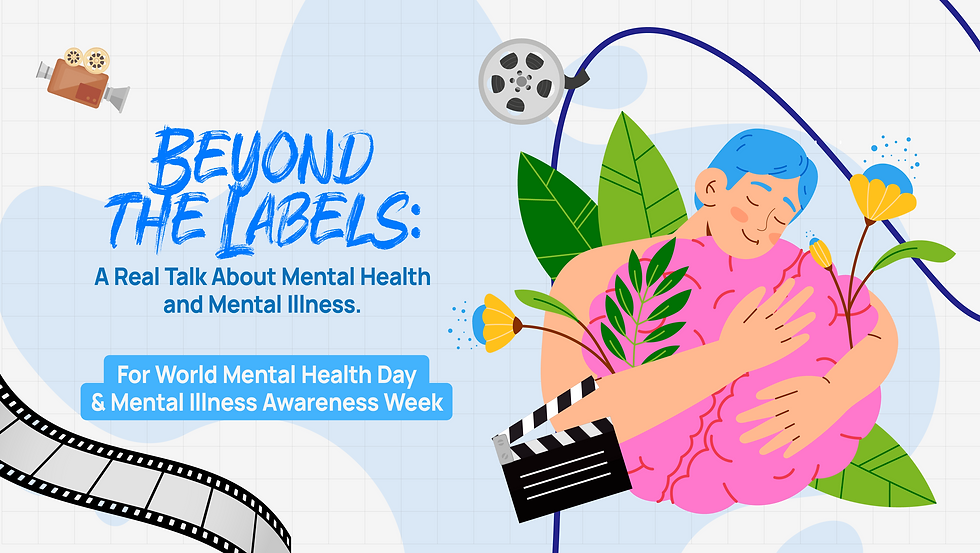Beyond the Labels: A Real Talk About Mental Health and Mental Illness
- Oct 10, 2025
- 4 min read

(For World Mental Health Day & Mental Illness Awareness Week)
If you’ve ever worked a long shoot, you know the difference between being tired and being run down. The same goes for our minds. We all have mental health, just like we all have physical health and both can move up and down depending on what’s happening in our lives.
Some days, our mental health is strong: we feel connected, focused, and grounded. Other days, exhaustion, uncertainty, or life stress push us into rougher waters. That’s part of being human.
But for some people, mental health challenges go beyond the usual ups and downs. They may live with a mental illness; a condition like depression, bipolar disorder, schizophrenia, or PTSD. These illnesses can have a major impact on thinking, mood, and functioning, and often require professional care or ongoing treatment.
Here’s something we don’t talk about enough:You can live with a mental illness and still have good mental health.
A Helpful Model
Think of mental health and mental illness as two factors in the mix of our mental wellbeing.
mental health, from poor to strong.
mental illness, from none to severe.
Depending on where our mental health is and whether we have an active illness, it results in four zones of wellbeing:
Flourishing: Good mental health, no significant mental illness.
Managing: Good mental health and a diagnosed illness that’s well-managed through support and treatment.
Struggling: Poor mental health, no diagnosed illness - maybe due to stress, grief, or burnout
Unwell: Poor mental health and a mental illness that’s active or untreated.
This model reminds us that people don’t live on a single line. Mental health isn’t a yes-or-no category, it’s a spectrum we all move along. We can have a diagnosed illness and still live a meaningful, balanced life. We can also have no diagnosis but still feel deeply unwell or disconnected.

A Story That Brings It Home
Here’s a composite story of how this could play out for someone in our sector.
Jess is one of those people who lights up a room, always the first to help, always in motion. Jess lives with bipolar disorder, something they have learned to manage over the years through medication, structure, and community support.
When things are steady, Jess is thriving: volunteering, mentoring younger crew members, organizing community meet-ups. You’d never know he has a mental illness, because they are also in good mental health.
But life happens. During a rough stretch last year - a family loss, some financial stress, and an industry slowdown - their mental health took a hit. The illness itself was managed, but their emotional reserves were low. They described it like “walking on a narrow rail with no balance pole.”
Then, months later, the opposite happened: their mental health felt strong again, but their illness flared. Medication needed adjusting, and he spent a few weeks in a supportive care setting. They said later that what helped most was not judgment or advice - it was knowing people reached out and cared, without shame.
That’s the heart of it: mental health and mental illness are not opposites. They’re different dimensions of our human experience.
Breaking the Binary: It’s not Us and Them
Too often, we separate “people with mental illness” from “the rest of us.” But that’s not reality. Everyone has mental health, and any of us can face challenges that affect our wellbeing or functioning.
Talking about mental health like physical health helps. We don’t shame someone for catching a flu or needing physio after an injury, so why would we judge someone for needing therapy, medication, or time off for their mental wellbeing?
If anything, those who manage long-term conditions often have some of the strongest resilience and insight. They’ve built coping systems, community, and courage most of us could learn from.
From Awareness to Action
During World Mental Health Day (October 10) and Mental Illness Awareness Week (October 6–12), we’re reminded that awareness is only the start. What truly matters is connection, checking in on ourselves and each other, and knowing where to find support when it’s needed.
If someone you know is struggling - or if you are - it’s okay to speak up. You don’t need to have the perfect words. Just start with something simple: “Hey, you’ve seemed a bit off lately. How are you holding up?” That small question can open a big door.
You can also reach out for confidential help through programs like:
Member/Employee Assistance Programs for all union members – confidential, free counselling support for people in the film and television industry.
Pathways Serious Mental Illness Society - education and support for family and friends of people with serious mental illness
BC Schizophrenia Society: https://www.bcss.org/ - resources and support for individuals and their families
Centre for Addiction & Mental Health https://www.camh.ca/health-info/mental-illness-and-addiction-index?query=*&facets=filter_tags:5B480C3FD230426F953C5AD52F8EF444 - directory of information on mental illesses
BC Mental Health Line: Toll Free (no area code) 310-6789 - offers emotional support, information on appropriate referral options, and a wide range of support relating to mental health concerns.
Final Take
Let’s keep talking about mental health as openly as we talk about a broken arm or a sprained back. Because on set and off, we all deserve to feel safe, supported, and seen.
This October, let’s make space for real conversations - not just awareness, but understanding. Because we all have mental health.And we all do better when we look out for each other.
Call to Action:
This month, check in with yourself, with your crew, with your people. One simple conversation can make a world of difference.



Comments